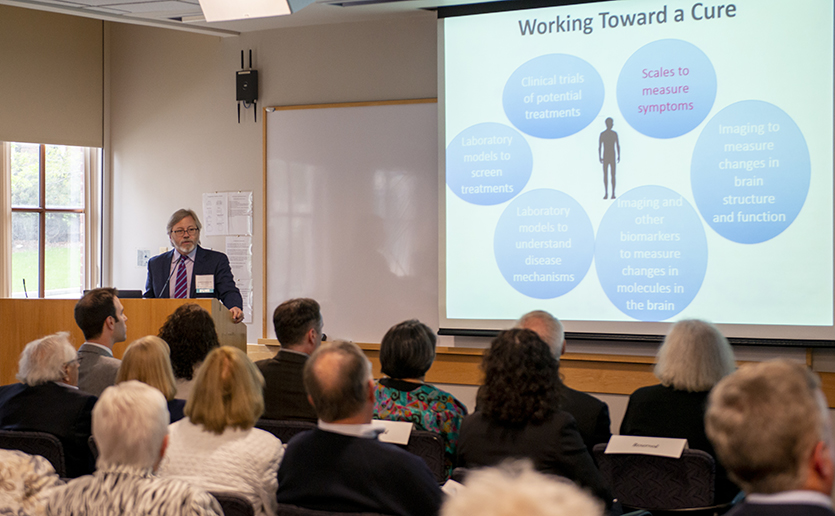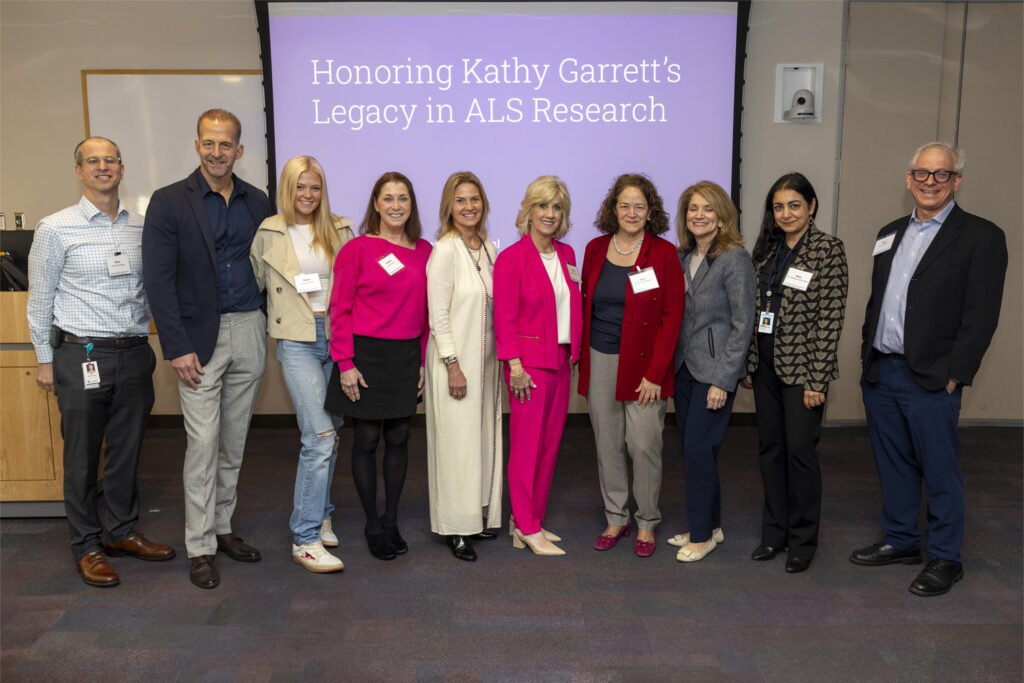Determined collaboration and groundbreaking technology have led to exciting advances in efforts to solve the challenges of brain diseases, researchers from the MassGeneral Institute for Neurodegenerative Diseases (MIND) told patients, families and friends recently.
On May 16, 2018, nearly 100 people attended the event at the MIND labs at the Charlestown Navy Yard. MIND’s Visiting Day gathering included a reception and presentations by researchers working in amyotrophic lateral sclerosis (ALS), frontotemporal disorders, Parkinson’s disease and dystonia.
MIND founder Anne Young, MD, PhD, and Merit Cudkowicz, MD, MSc, chair of Neurology, highlighted the interdisciplinary collaborative environment at MIND. Both emphasized the great impact philanthropy plays in supporting promising ideas at their earliest stages, encouraging scientists in different specialty areas to share ideas, equipment and insights to accelerate their research.
Advances in each field can help accelerate progress in other fields when common symptoms or biological mechanisms are identified …
New Tools, Extraordinary Images
New imaging and genomics allow researchers to pinpoint with extraordinary accuracy the pathways behind many neurological disorders. These innovative technologies provide clinicians with a better understanding of a disease, and encourage the basic science investigators to identify therapies that can target a specific area of the brain.
Brad Dickerson, MD, who specializes in frontotemporal disorders, provided an overview of the research efforts to find cures for neurological diseases, a process that starts and ends with patients. Clinicians document symptoms, perform tests and neurological exams, measure structural, functional and molecular changes in the brain through imaging and fluid samples (such as spinal fluid), develop laboratory models to understand disease mechanisms and screen treatments.
This research helps identify potential therapies that are brought to our patients for testing in clinical trials. This work is often done independently in separate clinics and laboratories by neurologists studying diseases traditionally classified as distinct, such as frontotemporal dementia and amyotrophic lateral sclerosis, or primary progressive aphasia and Alzheimer’s disease. But advances in each field can help accelerate progress in other fields when common symptoms or biological mechanisms are identified that link these seemingly distinct illnesses to each other.

Brain Disease Similarities Explored
“As one example, we are increasingly interested in whether multiple different neurodegenerative diseases share abnormalities in the brain’s inflammatory responses,” Dr. Dickerson said. “This might allow us to screen new therapies that may reduce that neuroinflammation in more than one disease as a way to slow progressive decline. Clinical imaging and biomarkers provide critical data in real time so that we can track the impact of therapies being tested on brain function and ultimately on symptoms.”
Mark Albers, MD, PhD, who specializes in memory disorders, talked about the challenges confronted by the immune system as a person ages. “Activation of the immune system within older individuals may trigger an orderly propagation of dysfunction and death within neural systems,” he said. “When one neuron dies, it makes neighboring neurons vulnerable, and when the relevant cells disappear it is harder to understand what went wrong.”
MIND’s interdisciplinary collaboration has created opportunities for “basket” trials that allow for the evaluation of a therapy on several diseases …
Investigating Inflammation
MIND’s interdisciplinary collaboration, however, has created opportunities for “basket” trials that allow for the evaluation of a therapy on several diseases within the same clinical trial. Dr. Albers is currently exploring the effectiveness of an FDA-approved drug called ruxolitinib, which reduces anti-inflammatory signals and is used to treat blood disorders associated with aging. Dr. Albers is hopeful this drug can reduce inflammation in three neurodegenerative diseases, and will test the effectiveness of the drug to reduce inflammatory biomarkers and clinical outcomes on three different diseases at the same time.
While the initial “basket” trials focus on inflammation, other researchers are looking at movement disorders, which affect patients with Parkinson’s, ALS and dystonia.
Todd M. Herrington, MD, PhD, approaches the brain as an electrical system in his efforts to reduce the toll of movement disorders, while Nutan Sharma, MD, PhD, and Cristopher Bragg, PhD, are looking closely at one specific form of dystonia to shed light on other movement disorders.
Leveraging New Technologies
“The production of dopamine is disrupted in people with Parkinson’s disease, but other areas of the brain are also dysregulated,” Dr. Herrington said. “I am eager to leverage the Martinos Center for Biomedical Imaging’s advanced neuroimaging technologies so that we can target individual brain circuits and use deep brain stimulation to reduce the impact of Parkinson’s disease on patients, particularly tremors, slowness and stiffness.”
Dr. Sharma and Dr. Bragg, talked about their research breakthrough in X-Linked Dystonia Parkinsonism, a rare disease that has provided insights into other movement disorders.
“By finding the gene that causes this form of dystonia we are learning a great deal about the disease mechanisms, which will provide great information as we test potential therapies for this disease and other movement disorders,” Dr. Bragg said.
To learn more about how you can support research at MIND, please contact us.
MIND: Collaborating for a Cure
 The MassGeneral Institute for Neurodegenerative Disease (MIND) is committed to finding treatments and cures to improve the lives of patients with neurodegenerative disorders including Alzheimer’s, amyotrophic lateral sclerosis (ALS), Huntington’s and Parkinson’s disease.
The MassGeneral Institute for Neurodegenerative Disease (MIND) is committed to finding treatments and cures to improve the lives of patients with neurodegenerative disorders including Alzheimer’s, amyotrophic lateral sclerosis (ALS), Huntington’s and Parkinson’s disease.
Founded in 2001, MIND unites scientists and physician-scientists across disciplines with the common goal of translating laboratory findings into therapies that can reach patients in the clinic. Researchers in MIND laboratories work collaboratively to achieve the most promising results.
To learn more about MIND, please visit our website.





